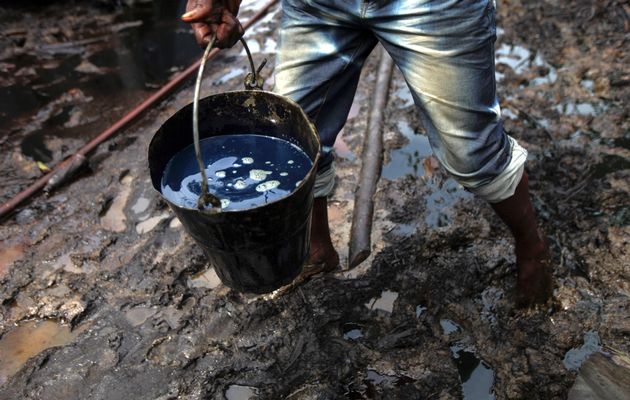Oil theft: How security agents connive with criminals, Ex-Naval Commander tells Reps
A retired Naval officer and former commander of Operation Delta Safe, Rear Admiral Suleiman Apochi, has informed the House of Representatives Committee investigating oil theft that the menace is a criminal enterprise executed through the connivance of three entities. He made the claim while speaking before the committee on Friday. According to him, the criminal […]

FILE PHOTO: Oil theft
A retired Naval officer and former commander of Operation Delta Safe, Rear Admiral Suleiman Apochi, has informed the House of Representatives Committee investigating oil theft that the menace is a criminal enterprise executed through the connivance of three entities.
He made the claim while speaking before the committee on Friday.
According to him, the criminal triad consists of the official operators in the industry, corrupt security agents and the sponsors of the criminals stealing the petroleum products.
He noted that there was no way crude oil could be stolen from the nation’s export pipeline without the collaboration of the three parts of the criminal gangs.
- Protest: Mobilisers importing mercenaries, IGP alleges
- #IStandWithDangote trends as Netizens demand support for Nigerian investors
According to him, nobody will attempt to take crude from the pipeline without insider information.
Rear Admiral Apochi said the information was needed by the criminals because of the pressure in the pipelines which is enough to kill any person attempting to breach the pipes.
According to him, the criminals breach the pipes when there is no pressure or flow and then come back to siphon during flows.
The retired Naval officer informed the committee that the criminals cannot breach the pipes without the cover by corrupt security agents because security agents were supposed to carry out 24-hour surveillance on the pipes.
He said, “The pressure of flow on the lines is usually very high and nobody can afford to take crude illegally from the pipelines when there is crude on the line. It can only happen when there is no crude and only one set of persons will be aware when the pipeline is dry.
“What that means is that those who operate the lines are working with the sponsors of these criminal gangs to steal our crude and these are people who are well known. If I mention names here, you will be shocked.
“Also, security agents are part of this arrangement because they are supposed to keep vigil on these lines throughout the day. But we have the vessels coming to the piplelines, stop, take crude unchallenged and leave without anyone challenging them. Where are these security men who are supposed to guard these pipelines.
“The big boys who have money are the ones who work with these other two to create passage for these boys to connect to the piplelines and carry out their neferous activities successfully”.
He however informed the committee that while he was in charge of Operation Delta Safe, the country was able to increase its crude oil production from about 900,000 barrels per day to about 1.5mbpd until he left the operations.
He said he was able to stop many criminal gangs operating in the area as well as arrested and destroyed many vessels stealing crude oil.
He said the only way to end crude oil theft was to ensure that there are no sacred cows and those arrested are brought to book.
In its presentation, the Department of State Services (DSS) represented by the Deputy Director, Operations Department, Abdulkadir Salisu, called for strengthening of existing laws to ensure that those involved are promptly brought to book and prosecuted.
In his remarks, Chairman of the special committee, Alhassan Ado Doguwa, assured that the committee would ensure that all available legislative tools are used to guide the process of protecting the oil industry from the massive losses caused by criminals.
He said, “The committee aims to collaborate with global partners, leverage cutting-edge technologies, and enhance security architecture to effectively address and eliminate crude oil theft in the hydrocarbon value chain.”
